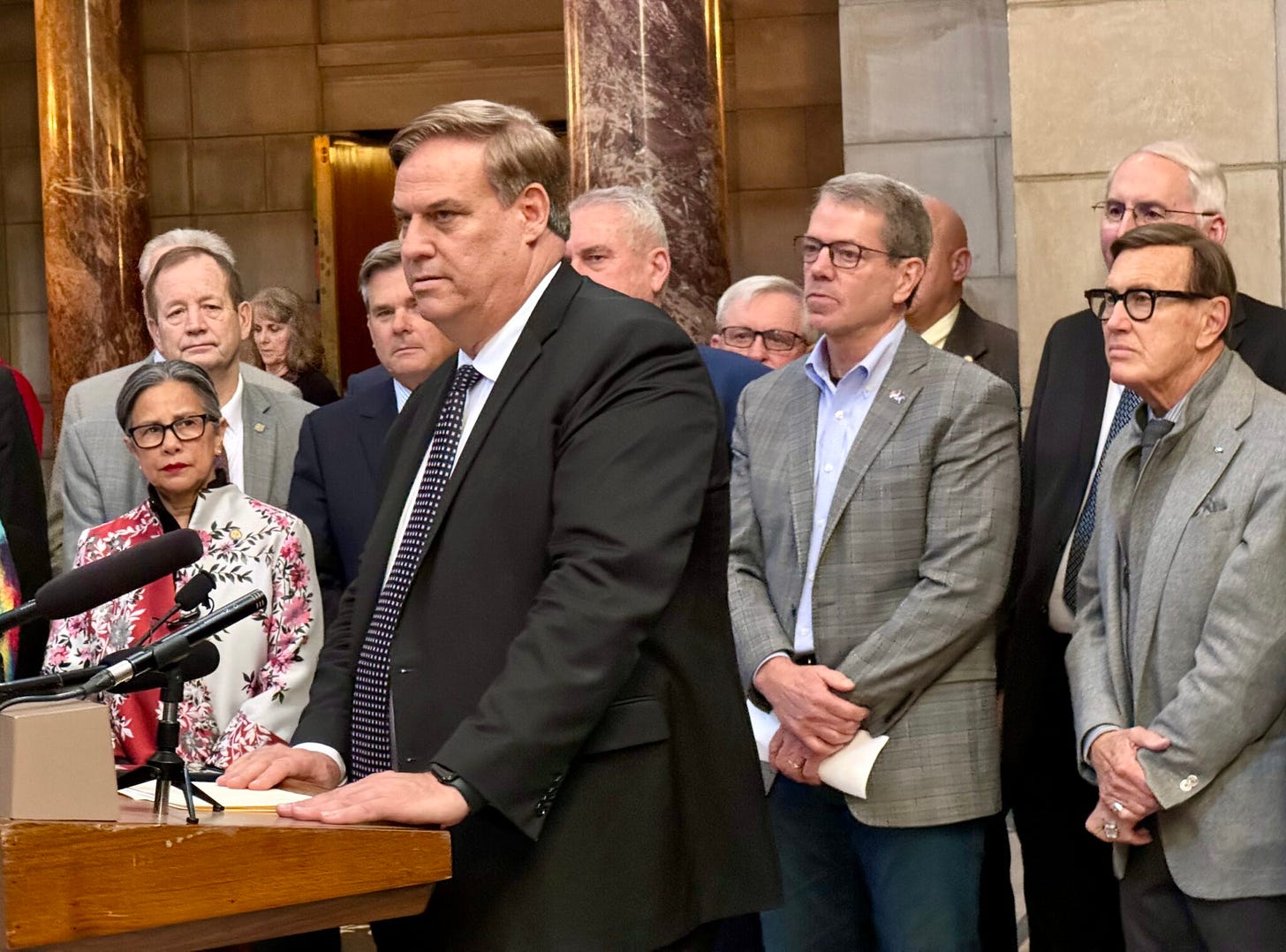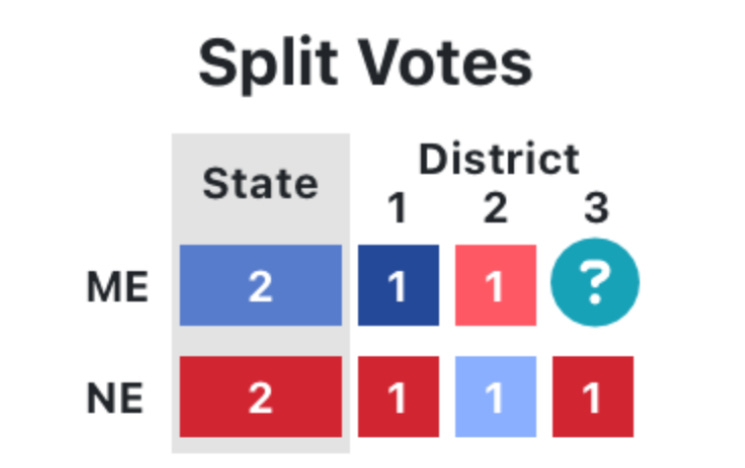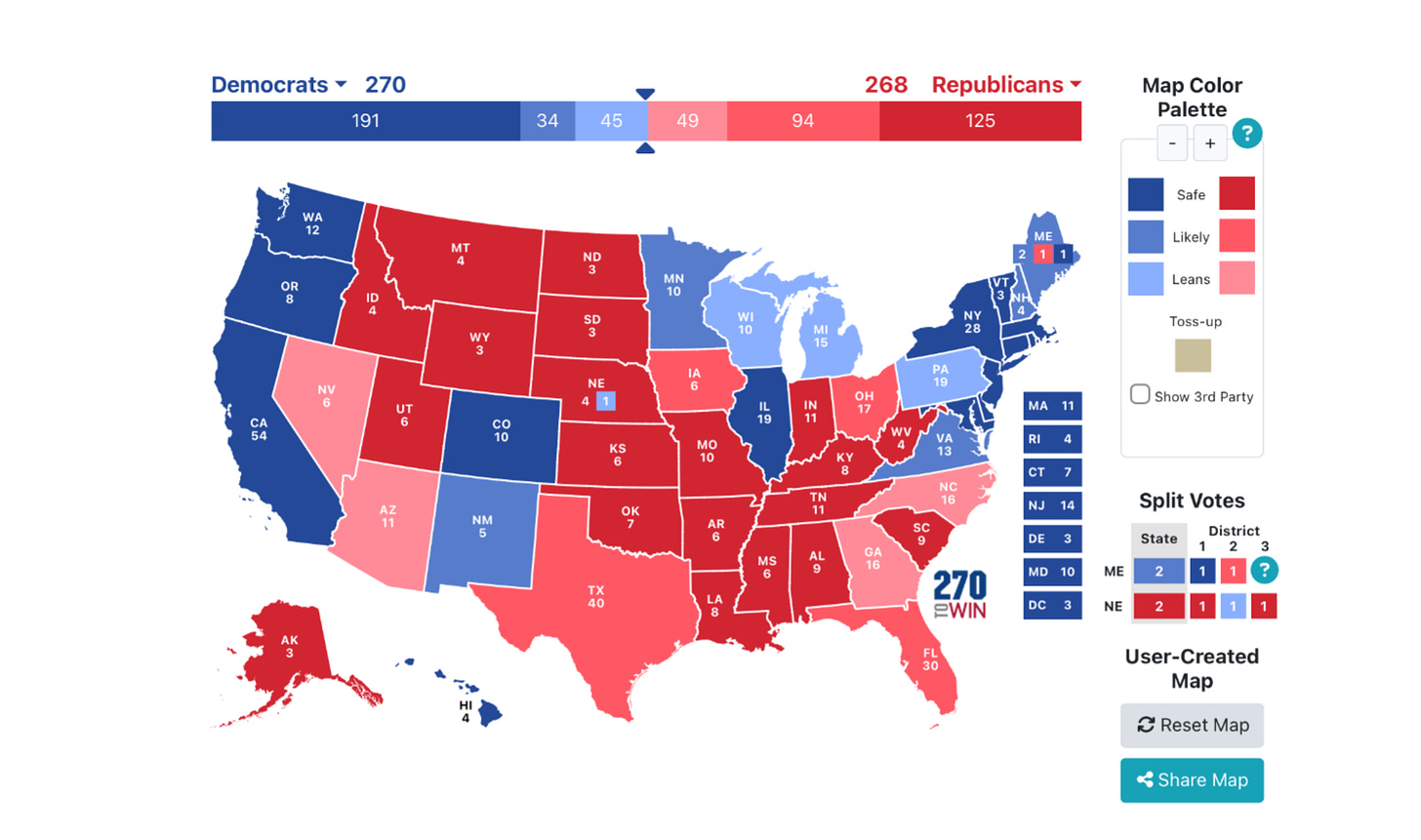We Just Dodged an Electoral Bullet
How a single vote by a single state senator might have changed the election’s trajectory.
Phew.
My insides have been a bit tied up lately as I watched what was unfolding in, of all places, Nebraska over the past few days. You may not fully know it, but the whole national election nearly went up in smoke over some real down and dirty tricks in the Cornhusker state.
As you may have heard, over the past week Republican officials in Nebraska, at the urging of national GOP leaders like Donald Trump and Sen. Lindsey Graham, tried to push through a last-minute change to how it awards its five Electoral College Votes. Through a weird quirk of the math, and a difference between how laws get enacted in Nebraska versus how they do in Maine (I will explain this, I promise), the GOP tried and very nearly succeeded in scrambling the electoral map and giving Trump one more possible—and some say even quite plausible—path to reelection.
I had intended to write about this dastardly plot today and urge readers here to write emails and call, just as I did over social media on Friday. (Many thanks to all who responded and leapt to action!) Thankfully, I can write about it now in hindsight, because the scheme is now dead in the water and going nowhere. Deep breath, exhale.
In today’s piece, I’ll explain the quirky Nebraska electoral award system along with its counterpart in Maine. And I’ll lay out how it could produce a nightmare scenario of a tie in the Electoral College—one that had my blood pressure up far higher than I like it to be. Lastly, I’ll walk through what may have led to this plot’s defeat on Monday and all of us being able to breathe easier.
Winner Take All, Except in Nebraska and Maine
If you’ve ever played around with an electoral college map (like I do nearly daily, gaming out scenarios), you’ll quickly notice some weird options, often contained in side boxes outside the physical map. There you will find two states, Nebraska and Maine.
This is because while 48 states are on a winner-take-all system, Nebraska and Maine allow their congressional districts to split the pie. Most people don’t pay much attention to this quirk because it all comes out in the wash: Typically, NE-2, which is home to Omaha, goes blue while ME-2, which is largely rural, goes red. They frequently just cancel each other out.
This system has been in place in Nebraska since 1992. NE-2 has awarded its single Electoral College vote twice to the Democratic candidate. And it is expected to go blue this year as well.
Note that some polling indicates the race in Maine’s second district could be close, with a small chance of it flipping blue. But given how rural it is, Trump support runs high, and I expect it will remain in the GOP column. But which side wins ME-2 almost wound up mattering a lot, as I’ll explain below.
But, really, who cares about one vote?
Modern elections are won on vanishingly thin margins, especially in the battlegrounds. Back when Florida was a swing state, Al Gore lost it by just 537 votes out of 5.8 million votes cast. That’s just nine-thousandths of a percent.
We have a vestigial and antiquated Electoral College system where a candidate can win the popular election but still lose the Electoral College vote. That has happened twice this century already. Indeed, only one Republican president, George W. Bush, has won the popular vote in over thirty years. And due to the strange electoral math, a single E.C. vote could change the outcome of the entire race.
Here’s that scenario: Some recent polls suggest that Harris has maintained strength in the “Blue Wall” states of Michigan, Wisconsin and Pennsylvania, but Trump still leads marginally across the Sunbelt states of Arizona, Nevada, Georgia and North Carolina. Were this to remain the case by Election Day, Harris would still narrowly defeat Trump 270 to 268.
But notice something about Nebraska? Yup, there’s a blue dot near Omaha. Take that away and change nothing else, and suddenly we have a nightmare: a 269 to 269 tie.
At this point, we’d have to dust off the Constitution and take a look at what it says in the event of an Electoral College tie. The relevant language appears in the 12th Amendment, and it’s no bueno. Speaking about the number of appointed Electors, it reads:
The person having the greatest number of votes for President, shall be the President, if such number be a majority of the whole number of Electors appointed; and if no person have such majority, then from the persons having the highest numbers not exceeding three on the list of those voted for as President, the House of Representatives shall choose immediately, by ballot, the President. But in choosing the President, the votes shall be taken by states, the representation from each state having one vote; a quorum for this purpose shall consist of a member or members from two-thirds of the states, and a majority of all the states shall be necessary to a choice.
In plainer English, this means that if no candidate has a majority of electoral votes, the decision would get thrown to the U.S. House. But it’s not a majority vote of the House members. Instead, each state’s delegation would receive one vote out of 50. Because the GOP controls more state delegations in the House, this almost certainly would guarantee a second Trump presidency.
Keep the 12th Amendment in mind, by the way, when we get to a discussion in the coming weeks about how Trump may attempt to keep Harris from achieving a majority of the appointed Electors—just as he tried to pull off using Vice President Mike Pence as an arbiter of certifiable electoral slates back in the 2020 election.
Mutual Assured Destruction
In the past, whenever the GOP-dominated legislature in Nebraska rattled its sabers and threatened to go nuclear by changing its electoral award system, the Democratic-controlled Maine legislature would respond in kind. So when Nebraska started making noise again, Josh Marshall laid out his astute take in his Talking Points Memo newsletter:
When I first saw this I thought, well, what’s the point? Maine is locked and loaded to counter and neutralize it…. At the time Democratic leaders in Maine made very clear that they were ready to do this. The Democratic House Majority Leader put out a statement. It is my strong recollection they also said that if Nebraska came back and tried to do it later they’d counter it then. So basically: don’t try, Nebraska Republicans. There’s no point.
In my International Arms Control class back in college, we learned the term “MAD”—Mutual Assured Destruction—when it came to going nuclear. MAD had a deterrent effect, promoting what the negotiating parties called a detente, or easing of hostilities.
But when it came to Nebraska, there was a problem it seemed no one had thought of, even though they really ought to have. As Marshall explains,
In Maine, a law takes 90 days to go into effect. Nebraska has no such restriction. You can overrule that with a super-majority. But Maine Democrats don’t have legislative supermajorities. We’re way under 90 days before the election. But critically we’re now under 90 before electoral votes are cast on December 16th….
[S]ince the new Republican effort seemed to start up almost to the day after the 90-day limit passed, it really seems like they were waiting for that moment to begin another effort.
When I read this, my heart sank. This felt like a ploy Senate Minority Leader Mitch McConnell himself would have cooked up. Nebraska could move last minute to change its laws, and Maine could no longer hit back. There would be no more Mutual Assured Destruction, and therefore no real deterrence.
Send Lindsey, and get Donald on the phone
Over the past few days, the GOP sought to push through an 11th hour change to make Nebraska a winner-take-all state, effectively denying Kamala Harris that one potentially critical vote, at a time when Maine could not hit back with the same.
Sen. Graham even went out to Nebraska to do the dirty work, which seems to be his specialty after what we saw him do with Georgia officials during the last election. (That earned him a subpoena in the Georgia RICO trial, and he narrowly dodged being indicted for it.) He began to pressure state senators to change the law, and then the big orange man weighed in. Per reporting by the Washington Post, three days ago:
Former president Donald Trump spoke by phone this week with a Nebraska state senator as part of a last-minute push to change how the state allocates its electoral votes and block the easiest path Vice President Kamala Harris has to win the White House.
State Sen. Merv Riepe (R) said he spoke briefly by phone with Trump on Wednesday in the presence of Nebraska Gov. Jim Pillen (R) during a visit by Sen. Lindsey Graham (R-S.C.), who encouraged Republicans in the state’s unicameral legislature to change to a statewide winner-take-all electoral vote system.
“I want the law changed. I’ve made no qualms about it,” said Graham, an ally of Trump, who said he traveled to Nebraska at the request of Sen. Pete Ricketts (R-Neb.), the former governor. “They were open-minded. I said: ‘Listen, it’s your decision to make. It comes down to one electoral vote. I want you to understand what that one vote would mean.’”
The pressure was on.
State politics, with national impact
To get a bill through in the unicameral Nebraska legislature, you need to get it past a filibuster, and the Democrats were ready. But unfortunately, they alone did not have the numbers.
To break a filibuster in Nebraska requires a two-thirds vote. That means that in the 49-seat chamber, the magic number to enact legislation is 33 votes. Republicans used to have 32 of them, but now they have 33.
To understand why, we need to look at the political trajectory of a 40-year Democrat who recently turned Republican, State Sen. Mike McDonnell. In April of this year, he switched his party affiliation after a long dispute with state Democrats. McDonnell is a firefighter and union leader but is also a Catholic who is staunchly anti-abortion. He wanted his fellow Democrats to respect his position on abortion, but his votes against abortion rights led to censure by the party and to him splitting off from it and joining the Republicans.
Whether McDonnell would vote with Republicans or with the Democrats on the electoral law change would mean the difference between the bill passing or dying this year. (Two other GOP state senators were also noncommittal on the vote but were awaiting McDonnell’s decision.) Back in April, when he switched parties, McDonnell said he would not support an electoral vote allocation change for the state, and on Monday, after a long deliberation under pressure from constituents and national leaders of both parties, he stood by that decision.
“In recent weeks, a conversation around whether to change how we allocate our Electoral College votes has returned to the forefront,” Mr. McDonnell said in a statement. “I respect the desire of some of my colleagues to have this discussion, and I have taken time to listen carefully to Nebraskans and national leaders on both sides of the issue. After deep consideration, it is clear to me that right now, 43 days from Election Day, is not the moment to make this change.”
McDonnell told Republican Governor Jim Pillen, “I will not change my long-held position and will oppose any attempted changes to our Electoral College system before the 2024 election.” He instead favors a constitutional amendment next year, which would require a statewide vote to alter how the state awards its electoral votes.
McDonnell is also considering a run for the mayorship of Omaha, and that may have played a part in his decision. The people of that city might not appreciate having their presidential votes nullified by a new law.
The knife’s edge
This episode is yet another example of how a broken Electoral College system continues to plague our politics and create opportunities for mischief with resulting crises. Bad actors can exploit loopholes, single failure points, or ambiguities in the system to sow discord and throw elections. From a longer term standpoint, attempts to game the system have the knock-on effect of disillusioning U.S. voters about the fairness and integrity of the system—a matter already under intense pressure due to Trump’s spreading of the Big Lie about a stolen election.
Efforts to reform the system are crawling along. There’s the National Popular Vote law, which aims to bring together enough states, by agreement, to award their electoral votes and therefore the presidency to the winner of the national popular vote. The count among the states that have adopted this compact currently stands at 209 out of the 270 Electoral College votes needed, so this likely won’t be happening soon. And it would still have to pass legal muster before this right-leaning Supreme Court.
Until we can find a way to amend the Constitution or get around the confines of the Electoral College, we will be faced with situations like we just witnessed in Nebraska. From where I stand, the best way forward is to focus on turning one more big state, like Texas or Florida, blue. Should that occur, Republicans may be far more amenable to getting rid of the Electoral College because it would no longer give them any leverage. On the contrary, it would act to disenfranchise their voters in the largest states. At such time, Democrats should be prepared to agree to electoral reforms that are best for the country and our democracy, just as we have done with respect to gerrymandering in places like California, Michigan and Wisconsin.
I remain hopeful that this is achievable, once we have the numbers and one more big state in our column to do it. Until that day arrives, however, we must be on our guard to deter and prevent dirty political tricks.







This piece has been corrected to note that Republicans, not Democrats, used to have 32 of the seats, and now they have 33.
Here is a VERY convincing analysis from the Florida front lines about our chances in Florida courtesy of Scott Dworkin.
https://substack.com/@scottdworkin/p-149060157
Nikki Fried is the new Dem chair there and it looks like she's repaired the damage to the ground game in Florida. She also notes that, as of now, there is virtually no ground game by the Trumpstans in Florida.
Texas is winnable, too. Allred is ahead by a point in at least one poll. This suggests to me that Kamala is doing better than the MSM will lead us to believe.
I want to believe in the highest of goals. I want Florida AND Texas. I've lived in Texas. It's full of ranchers, oil men, and diverse blue cities. It's doable. Don't let anyone tell you otherwise.